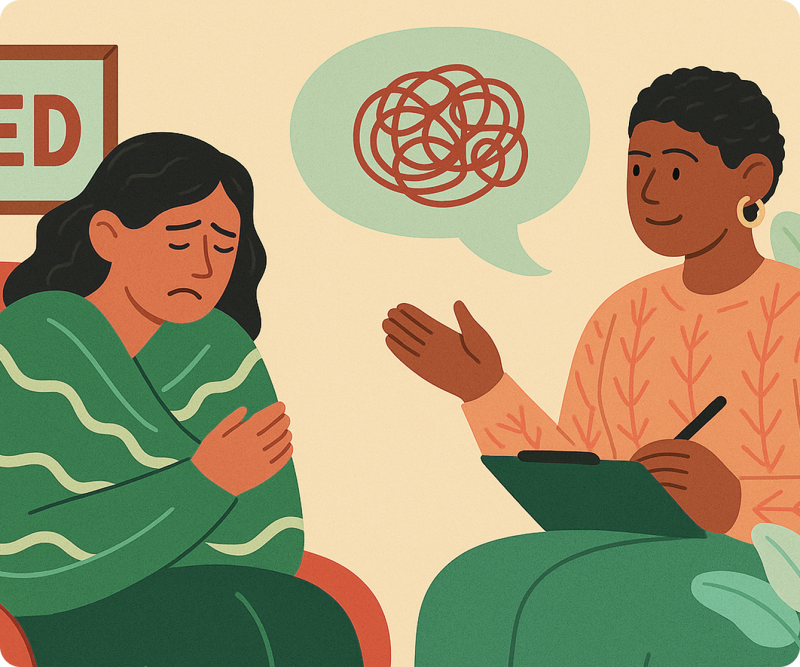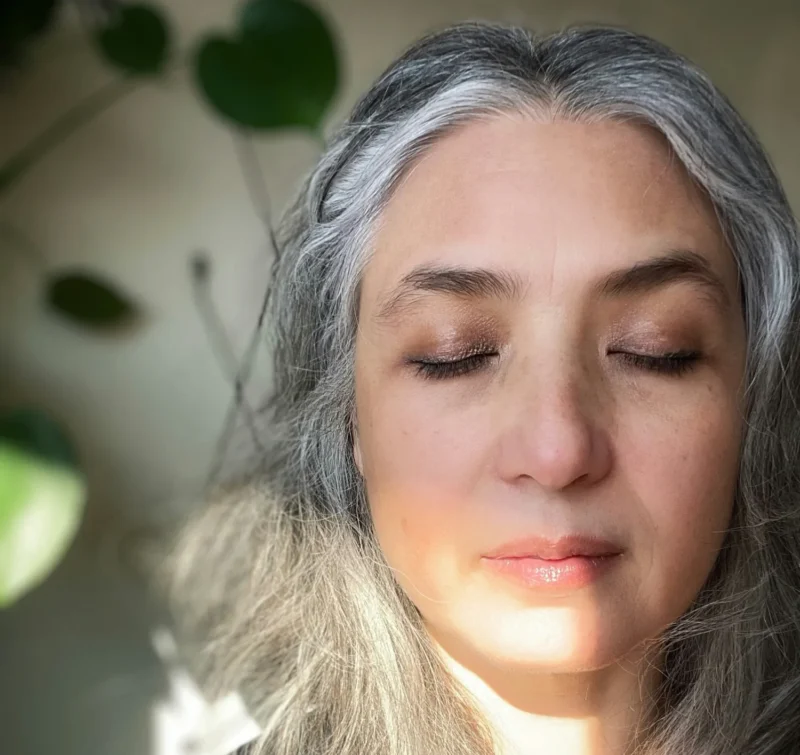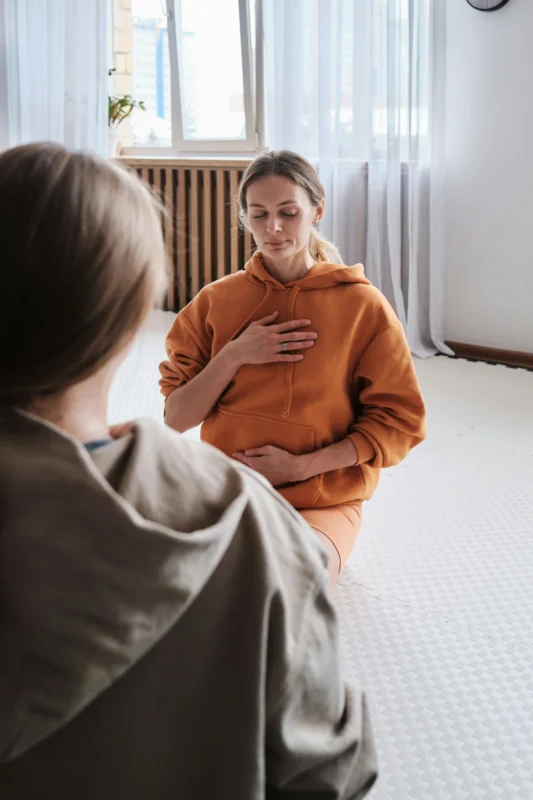
Post-Traumatic Stress Disorder (PTSD)
Post-Traumatic Stress Disorder (PTSD) is a psychological condition that may develop following exposure to traumatic events involving actual or threatened death, serious injury, or sexual violence. This exposure may be direct, witnessed in person, or experienced repeatedly in the course of one’s work—such as for first responders like paramedics, police officers, and emergency workers. PTSD can affect people from all walks of life. It can emerge shortly after a traumatic event or may not surface until months or even years later. Fortunately, effective treatment is available, and recovery is possible.
Common signs & symptoms
PTSD is characterised by four main symptom clusters:
- Re-experiencing the trauma
- Intrusive memories, thoughts, or flashbacks
- Nightmares or distressing dreams
- Intense emotional or physical reactions to reminders of the trauma
- A feeling as though the event is happening again
- Hyperarousal and reactivity
- Feeling constantly “on edge” or hypervigilant
- Being easily startled or jumpy
- Difficulty sleeping or concentrating
- Irritability, outbursts of anger, or reckless behaviours
- Negative changes in thoughts and emotions
- Difficulty remembering aspects of the event
- Persistent negative beliefs about oneself, others or the world
- Emotional numbness or detachment from others
- Reduced interest in activities once enjoyed
- Difficulty experiencing positive emotions
- Avoidance behaviours
- Avoiding places, people, or activities that are reminders of the trauma
- Suppressing thoughts or feelings related to the event
- Avoiding conversations or news coverage about the trauma
These symptoms can significantly interfere with day-to-day functioning and may affect relationships, work, and physical health if left untreated.
What causes PTSD?
PTSD typically develops in response to exposure to one or more traumatic events, such as:
- Physical or sexual assault
- Serious accidents or natural disasters
- Military combat
- Childhood abuse or neglect
- Witnessing violence or injury
- Repeated exposure to distressing material (e.g. through one’s occupation)
Not everyone who experiences trauma will develop PTSD. Personal factors—such as previous trauma, coping style, support systems, and biological vulnerability—can influence a person’s risk.
What you can do
If you are experiencing PTSD symptoms, you are not alone—and help is available.
Early intervention can significantly improve outcomes. Self-care strategies include:
- Speaking to a trusted healthcare provider
- Connecting with support networks
- Maintaining a regular sleep routine
- Practicing grounding or mindfulness exercises
- Limiting exposure to distressing media or environments
However, professional psychological treatment is often necessary to address the core symptoms and underlying trauma.
How we can help
At Seed Psychology, we offer evidence-based treatments that can significantly reduce the symptoms of PTSD and help you regain a sense of safety and control.
These may include:
- Trauma-Focussed Cognitive Behavioural Therapy (TF-CBT) – helping to process trauma memories and challenge unhelpful beliefs
- Eye Movement Desensitisation and Reprocessing (EMDR) – a structured therapy designed to help desensitise and reprocess distressing memories
- Emotion regulation and grounding strategies – to reduce distress and improve day-to-day functioning
Our psychologists provide a warm, non-judgemental and trauma-informed environment. We understand that trauma affects people in unique ways and tailor our treatment accordingly to meet your individual needs.
If you think you may be experiencing PTSD, speak to your GP or contact us directly. We can help you find a path toward healing, resilience, and recovery.
Book an appointment today at our Brunswick East clinic or via telehealth across Australia.
Through connection,
change is possible
Our compassionate team at Seed Psychology is here to help you regain your wellbeing and navigate life’s challenges with greater confidence and clarity. Connect with us to book an appointment with a psychologist in our Brunswick clinic or via telehealth Australia-wide.
Available resources
Meet our amazing team of therapists
Our diverse team of psychologists offer individual, couples, and online therapy, as well as assessments. Beyond their expertise, they bring humanity and care, providing respectful, affirming support tailored to each person’s unique experience.
Freqeuently asked questions
-
You do not need a referral to see a Psychologist at Seed Psychology. However, if you’d like to claim a Medicare rebate, you will need a Mental Health Care Plan (MHCP) from your GP. With a MHCP, you may be eligible for rebates on up to 10 sessions per calendar year. These sessions can be used at any psychology clinic of your choice. To access Medicare psychology rebates, book an appointment with your GP and ask for a Mental Health Care Plan. Most referrals begin with 6 sessions, with the option to access 4 more after a review. Referrals can also be provided by a psychiatrist or paediatrician.
-
Yes, we offer in person sessions at our Brunswick East practice and secure online appointments. Our online services make it easy to connect with your Psychologist from anywhere, offering flexibility without compromising on care. Whether you attend in person or online, you’ll receive consistent, high-quality support.
-
To book an appointment, simply use our booking form, or call our client care team on 9388 8113.
-
Our goal is to make mental health care approachable, inclusive, and clear—so you always know what to expect.
Individual Therapy Sessions
- Private clients (no referral): $255 – $285
- Clients with a MHCP: $230 – $285
- Medicare rebates: $96.65 – $141.85 per session (depending on the clinician)
- Private clients (no referral): $255 – $285
-
At Seed Psychology, your safety and wellbeing are our highest priorities. While we are here to support you through regular therapy sessions, we are not a crisis service and may not be available outside of scheduled appointments. If you or someone you care about is in immediate danger, experiencing a mental health crisis, or needs urgent support, it’s important to seek help straight away through the appropriate emergency or crisis services. You can find a list of trusted organisations and services here that can provide immediate support when you need it most.











